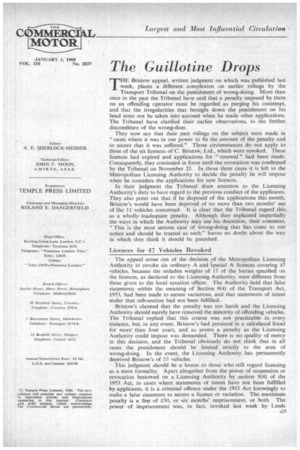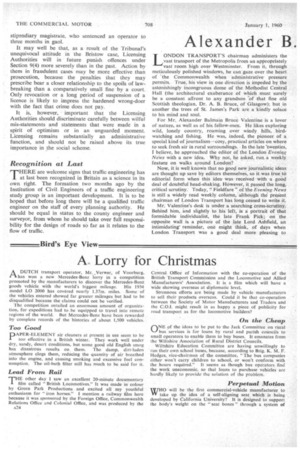The Guillotine Drops
Page 25

Page 26

If you've noticed an error in this article please click here to report it so we can fix it.
THE Bristow appeal, written judgment on which was published last week, places a different complexion on earlier rulings by the Transport Tribunal on the punishment of wrong-doing. More than once in the past the Tribunal have said that a penalty imposed by them on an offending operator must be regarded as purging his contempt, and that the irregularities that brought down the punishment on his head must not be taken into account when he made other applications. The Tribunal have clarified their earlier observations, to the further discomfiture of the wrong-doer.
They now say that their past rulings on the subject were made in "cases where it was in our power to fix the amount of the penalty and to secure that it was suffered." Those circumstances do not apply to three of the six licences of C. Bristow, Ltd., which were revoked. These licences had expired and applications for " renewal" had been made. Consequently, they continued in force Until the revocation was confirmed by the Tribunal on November 23. In those three cases it is left to the Metropolitan Licensing Authority to decide the penalty he will impose when he considers the applications for new licences.
In their judgment the Tribunal draw attention to the Licensing Authority's duty to have regard to the previous conduct of the applicants. They also point out that if he disposed of the applications this month, Bristow's would have been deprived of no more than two months' use of the 11 vehicles concerned. It is clear that the Tribunal regard this as a wholly inadequate penalty. Although they explained impartially the ways in which the Authority may use his discretion, their comment, "This is the most serious case of wrong-doing that has come to our notice and should be treated as such," leaves no doubt about the way in which they think it should be punished.
Licences for 47 Vehicles Revoked The appeal arose out of the decision of the Metropolitan Licensing Authority to revoke six ordinary A and 'special A licences covering 47 vehicles, because the unladen weights of 17 of the lorries specified on the licences, as declared to the Licensing Authority, were different from those given to the local taxation officer. 'The Authority held that false statements within the meaning of Section 9(4) of the Transport Act, 1953, had been made to secure variations, and that statements of intent under that sub-section had not been fulfilled.
Bristow's claimed that the penalty was too harsh and the Licensing Authority should merely have removed the minority of offending vehicles. The Tribunal replied that this course was not practicable in every instance, but, in any event, Bristow's had persisted in a calculated fraud for more than four years, and as severe a penalty as the Licensing Authority could impose was demanded. There is no quality of mercy in this decision, and the Tribunal obviously do not think that in all cases the punishment should be limited strictly to the area of wrong-doing. In the event, the Licensing Authority has permanently deprived Bristow's of 33 vehicles.
This judgment should be a lesson to those who still regard licensing as a mere formality. Apart altogether from the power of suspension or revocation bestowed on a Licensing Authority by section 9(4) of the 1953 Act, in cases where statements of intent have not been fulfilled by applicants, it is a criminal offence under the 1933 Act knowingly to make a false statement to secure a licence or variation. The maximum penalty is a fine of £50, or six months' imprisonment, or both. The power of imprisonment was, in fact, invoked last week by Leeds stipendiary magistrate, who sentenced an operator to three months in gaol.
It may well be that, as a result of the Tribunal's unequivocal attitude in the Bristow case, Licensing Authorities will in• future punish offences under Section 9(4) more severely than in the past. Action by them in fraudulent cases may be more effective than prosecution, because the penalties that they may prescribe bear a closer relationship to the spoils of lawbreaking than a comparatively small fine by a court. Only revocation or a long period of suspension of a licence is likely to impress the hardened wrong-doer with the fact that crime does not pay.
It is, however, important that the Licensing Authorities should discriminate carefully between wilful mis-statements and statements that were made in a spirit of optimism or in an unguarded moment. Licensing remains substantially an administrative function, and should not be raised above its true importance in the social scheme.
Recognition at Last
THERE are welcome signs that traffic engineering has at last been recognized in Britain as a science in its own right. The formation two months ago by the Institution of Civil Engineers of a traffic engineering study group is an important development. It is to be hoped that before long there will be a qualified traffic engineer on the staff of every planning authority. He should be equal in status to the county engineer and surveyor, from whom he should take over full responsibility for the design of roads so far as it relates to the flow of traffic.




























































































